5. Dongju: The Portrait of a Poet (Lee Joon-ik)
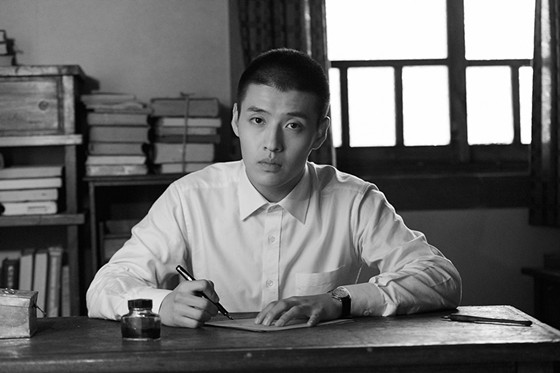
The film tells the tragic story of Yun Dong-ju and his best friend Song Mong-kyu. It starts in the 50s, during their university days where they both write poetry, but Song is the one who is recognized first. This event would shape their relationship to a large degree, with Yun adopting a place in life, somewhere below his friend, who was the definite leader of the two.
Later on, as Yun fails to publish his poems, they start a literary magazine, while Song becomes a political activist, chiefly against the Japanese Occupation. In 1942, when the Japanese pass a law forcing all lessons in Korea to be in the Japanese language, they move to Japan. They attend different universities, since Yun fails to pass the entrance exams for Tokyo University, and Song becomes one of the leaders of the Resistance. The film actually ends and starts with both of them imprisoned.
Lee Joon-ik directs a film that moves in two axes. The first one is in the present, when Yun Dong-ju is interrogated by the Japanese regarding his and Song Mong-kyu’s actions. The second axis unfolds in the past, as it describes the events that led to their arrest. In an elaborate practice, the two axes mirror each other, with the past one appearing according to the questions of the interrogation.
Furthermore, Yun’s poems, most of which are autobiographical, are also narrated according to the corresponding event appearing on screen. The synchronization of all the above is one of the film’s biggest traits and it finds its apogee in a sequence during the end, where scenes of both Yun and Song alternate in magnificent fashion. Consequently, the editing is masterful, despite the difficulty the narration presented.
Kang Ha-neul as Yun Dong-ju, and Park Jung-min as Song Mong-gyu, give great performances in radically different roles. The former wonderfully portrays a somewhat timid individual who relies largely on his friend, despite his obvious talent. Furthermore, one of the film’s greatest moments comes in a monologue he presents near the end. The latter presents, with equal ability, a true force of nature, as he appears unwavering by any obstacle that comes his way.
Their chemistry is also great, with Song being the definite leader in their relationship.
4. Bacchus Lady (Lee Jae-yong)
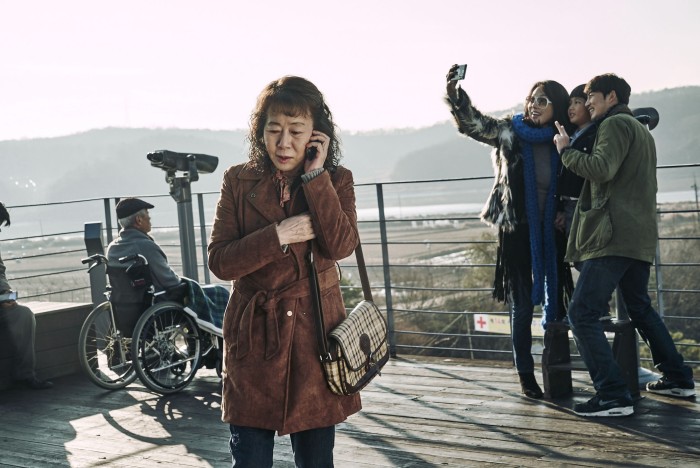
The title refers to a rather sad aspect of South Korean society, the “Bacchus Ladies”, elderly Korean prostitutes who solicit in parks and plazas in Seoul for sex in nearby motels. Their name derives from the popular Bacchus energy drink that they sell in parks where elderly men gather. The women are in their 50s, 60s, even their 80s.
The price of selling sex is about $20,000 to $30,000 won ($18-26) or even less if the man is a regular client. In a testimony, about 400 women work in Jongmyo Park in Seoul. The younger men from their 20s to 40s are also becoming their clients.
The film revolves around one of those women, So-yeong, who is 65 years old. In her rather sad life, she lives in a small complex along with a transvestite and a young man with one leg, and she tries to make ends meet by prostituting herself in parks, chiefly to elderly men. The story starts with her in a clinic where she is diagnosed with gonorrhea, in a sequence that unexpectedly ends up with her taking care of a little boy, whose mother is in jail for stabbing the doctor of the clinic.
The situation becomes more complicated, as the boy is Filipino and cannot speak Korean, and So-yeong has to occasionally take him with her when she is working.
The film follows So-yeong in her interactions, mostly with men, which include a young man who wants to shoot a documentary about the “Bacchus Ladies”, a very sick man in a hospital who desperately searches for a way to die, and another one who asks her to be with him as he commits suicide.
Lee Jae-yong pens and directs a film, which, at least in the beginning, is very hard to watch. Apart from the whole concept of the elderly prostitute, which is not very easy to witness (at least to my eyes), there are also some sex scenes between elderly people, which, although they feature almost no nudity, are rather graphic, with the realistic sound making them quite difficult to stand.
However, as the story progresses, the film becomes more subtle, after having realistically presented the actual work conditions of these women. After that point, Lee retains a somewhat relaxed rhythm, although the utterly sad ending sets things straight, regarding the reality of So-yeong’s life.
Yoon Yeo-jung is the definite star of the film as So-yeong, to the point that I do not think there is a scene in the film where she is not present. Her portrayal of a feisty woman who retains her dignity and pride, despite her profession, but due to the fact that she manages to make a living by herself, she is the film’s biggest asset. The scene where she exclaims “Don’t call me Granny, my vagina is still young” and the one where she fights with another Bacchus Lady are the most entertaining in the film.
3. The Wailing (Na Hong-jin)
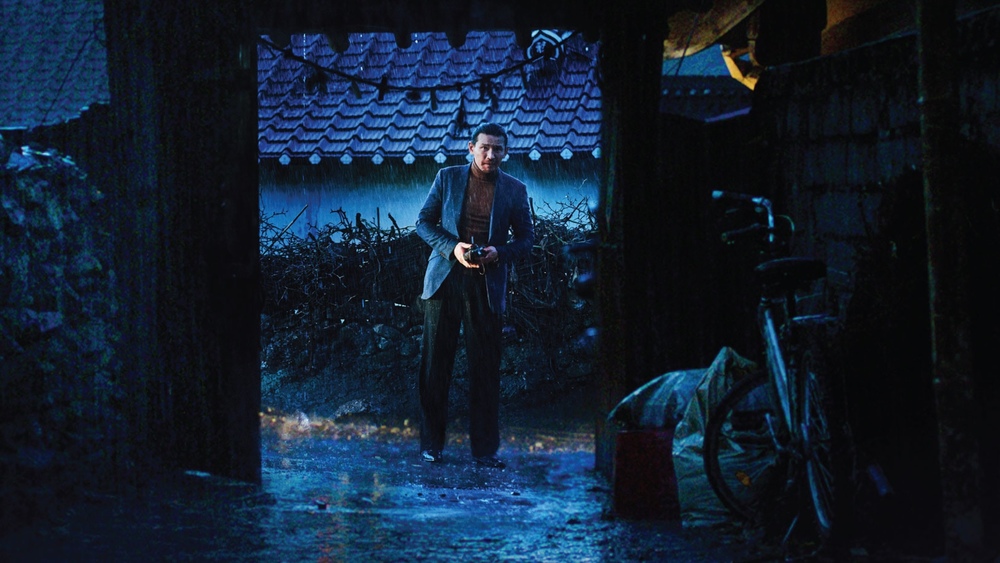
Na Hong-jin is one of those rare cases in South Korean cinema, which, despite him having enormous success with his films, he is not exactly eager to follow up. In that fashion, he has shot just three films in eight years, with the previous one (“The Yellow Sea”) screening six years prior. His absence was quite felt in the country’s cinema, but his return fully compensates.
In a seemingly peaceful village, a kind of epidemic suddenly breaks out, with people losing their minds and attacking their relatives, and with their skin suffering from a hideous infection. Their attacks have resulted in violent deaths, and the local police seem unable to deal with the case, eventually concluding that poisonous mushrooms are causing this behavior.
Among them is officer Jong-goo, who hears a rumor about a Japanese man living on top of a nearby hill being the actual perpetrator, a suspicion that becomes stronger after a strange young woman, Moo-myeong, confirms the fact. Eventually, he tracks down the man’s house and comes across a series of truly horrific spectacles.
Being kind of a coward himself, he tries to avoid the situation as much as possible, but when his little daughter, Hyo-jin, comes down with similar symptoms, Jong-doo is willing to go to extremes to save her. Meanwhile, his mother-in-law invites Il-gwang, a shaman, to perform an exorcism on the girl while a deacon named Yang Yi-sam is also involved, as a Japanese translator for the police.
Na directs and pens an agonizing thriller, building the tension gradually as the story progresses, until the utterly shocking finale, which is probably the film’s greatest sequence. He incorporates a plethora of horror favorite elements and notions, including zombies, vampires, demons, and exorcists, although the only one majorly implemented is the latter, with the rest mostly existing to create an atmosphere of supernatural horror.
In that fashion, he avoids the reef of hyperbole, maintaining a very serious approach throughout the film, despite some minor moments of unexpected humor. The pace is neither fast nor slow, but has the most fitting speed for the story, which artfully escalates as the time passes, until the impressive ending with the continuous plot twists. Apart from that, there is plenty of cursing, violence, and a number of truly grotesque bloodbaths and spectacles in general, which supplement the general aesthetics of the film.
Lastly, and on an additional level, the film makes a number of socio-political allegories, mostly regarding the current situation of the country.
The cast is another point of excellence, with Kwak Do-won giving a wonderful performance as Jong-goo, an easily intimidated police officer who transforms into a relentless hunter for the sake of his daughter. Kwak has been mostly cast in secondary roles through his career, and he proves in this film that he is made of protagonist material. Hwang Jung-min is great as usual as Il-gwang, in his path of becoming the next Song Kang-ho.
The one who truly steals the show, however, is Jun Kunimura as the mysterious Japanese man, whose acting and physique make him the perfect choice for the particular role, as he constantly exhibits a subtle but obvious threat, despite the fact that he does not speak very much.
Kim Hwan-hee is also great as little Hyo-jin in a rather difficult role that demanded her transformation from a cute and smart little girl to a violent, constantly cursing possessed individual. Lastly, the gorgeous Chun Woo-hee shines particularly in the end, with a truly eerie performance.
2. Asura:City of Madness (Kim Sung-soo)
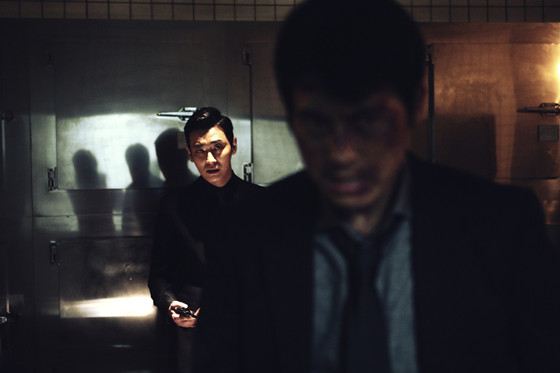
Han Do-kyung is a corrupt detective, who actually works for Park Sung-bae, the even more corrupt mayor of the city of Annam, in order to pay his wife’s medical bills, who has been diagnosed with terminal cancer. Park wants to push through a multi-million dollar development contract that will transform the city’s slums into modern housing, and make him a ton of money in the process. In order to do so, he is willing to go to any extreme, with Han being the one who takes care of the “dirty work”.
The DA, however, is on to Park, and has even found a witness that will testify against him. Han is the one tasked with dealing with the witness, in a series of events that end up with a fellow police officer dead and “Junkie”, a drug addict who helped him with the witness, being accused of his murder.
As Han is about to quit the police force and work openly for Park, he is approached by Internal Affairs, headed by special prosecutor Kim Cha-in and the leader of the investigation team, Do Chang-hak. They present him with proofs of his misdeeds and force him to turn against the mayor.
This series of events forces him to retract his resignation and instead abandon Park. In order to do so, he persuades his best friend, Moon Sun-mo, to take his place. As both opposing sides continue finding leverage with him, Han’s situation worsens even more.
Kim Sung-soo directs and pens a very dark film that focuses on its characters, none of whom is even remotely decent or likeable. Han may have been led to this life by his wife’s sickness, but shows no remorse in executing Park’s hideous orders. The fact that he tricks his best friend into taking his place makes him even more despicable, despite the fact that he is actually the victim of a power struggle between powers much higher than him.
Mayor Park is corrupt to the core; a true gangster who not only has connections with the underworld, but also acts as the leader of a crime syndicate. The fact that he has been publicly elected is a clear evidence of both his power and the city’s decay.
Special Prosecutor Kim and Do Chang-hak, who actually act as his henchman, may have the law on their side, but they are willing to go to such extremes to arrest Park that they end up acting like criminals themselves. Moon Sun-mo may be tricked into Park’s service, but as soon as he “tastes blood” and money, he becomes a remorseless gangster as well.
The power struggles between all the above characters, along with the constant shifting of both loyalties and the upper hand, are the backbone of an intricate script, which is concluded in the most spectacular fashion in the final sequence of the film. Furthermore, Kim presents a clear message regarding corruption, which, according to him, touches every aspect of Korean society, including justice and politics.
Since the film is largely based on its characters, the acting plays a rather significant role. Jung Woo-sung is great as detective Han, presenting a character that explodes under the pressure that comes from every aspect of his life. The fact that an actor who is frequently cast in the “lover” role has his image utterly trashed was a bold move, but he delivered to the fullest.
Hwang Jung-min as Mayor Park once more steals the show, this time in the role of the villain, which seems to suit him perfectly. I dare say that his performance reminded me of Robert De Niro in his gangster movies. Kwak Do-won is also great as the “legitimate criminal”, with his acting in the final sequence being the highlight of his performance.
Jeong Man-sik as Do Chang-hak, and Ju Ji-hoon as Moon-sun Mo, provide some great secondary characters, with the latter’s transformation to a hardcore criminal being quite impressive.
1. The Handmaiden (Park Chan-wook)
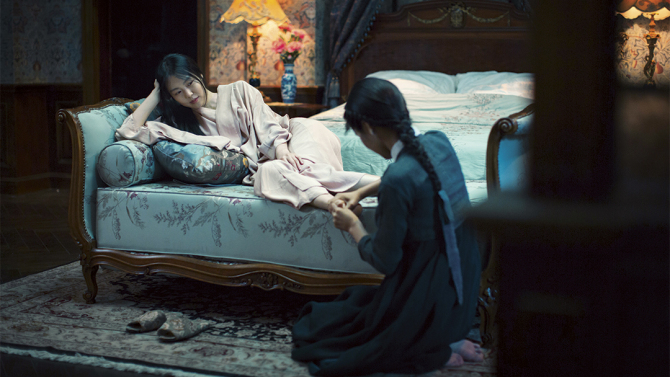
The script is based on the novel “Fingersmith” by Sarah Waters and takes place in Korea in the 1930s, with the country under Japanese rule. Con man “Count” Fujiwara has managed to insert himself into the very secluded circle of Kouzuki, an eccentric hedonist who has become the man in charge of a very large estate, and plans to marry his niece, Lady Hideko, the actual heiress of the family’s vast fortune.
Fujiwara devices an intricate plan to “steal” Lady Hideko for himself, and asks the help of a ragtag girl, Sook-hee, a petty criminal who lives with her aunt’s family, all of whom are of the same “profession”. The plan is for the girl to become Lady Hideko’s handmaiden, and to help Fujiwara seduce her. However, things do not go as planned, since an attraction is formed between the two girls, and the many plot twists result in a highly unexpected story.
Park stayed close to the structure of the book, which is split into three segments, with the first and the third telling the story from Sook-hee’s perspective, and the second one from Lady Hideko’s. In that fashion, he used strong narration, which is presented as the thoughts of the person that tells the story each time, and actually helps in understanding of the script. He refrained from his usual slow pace, directing a film that moves quite fast, as the events unfold very quickly and continuously.
However, his usual traits are once more present. The characters act like caricatures, as exemplified by Sook-hee and particularly Kouzuki, in perverse style. His irony, exemplified by the fact that the house combines Japanese with European-style architecture in a hideous manufacture that mocks the fact that rich people can do whatever they have in their minds, shows that they don’t necessarily have taste.
His dark and grotesque humor is exemplified in a torture scene where the victim seems to even indulge in his maiming. The abnormal eroticism is exemplified in the concept of the underground erotic literature club.
One of the film’s biggest and most obvious assets is its production value. Starting from the house’s interior, designer Ryu Seong-hee did a magnificent job in combining Japanese simplicity with the hyperbole of the baroque style, in an amalgam that is as stylish as much as it is grotesque, particularly in the lower levels of the house.
The cast also does a wonderful job. Ha Jung-woo plays the part of the cocky, seducing con-man Fujiwara to perfection; Kim Tae-ri is great as Sook-hee, the petty criminal who falls in love and can’t hide her frustration; and Cho Jin-woong is a distinct cult entry as the eccentric uncle Kouzuki, whose perversion is evident even from his appearance and the way he speaks.
The one that truly stands apart, however, is Kim Min-hee as Lady Hideko, who manages to portray a variety of different sentiments and notions as she transforms throughout the segments. The visual prowess of the production is exemplified by her almost porcelain beauty, as she frequently functions as a perverse and disturbed doll.
Author Bio: Panos Kotzathanasis is a film critic who focuses on the cinema of East Asia. He enjoys films from all genres, although he is a big fan of exploitation. You can follow him on Facebook or Twitter.